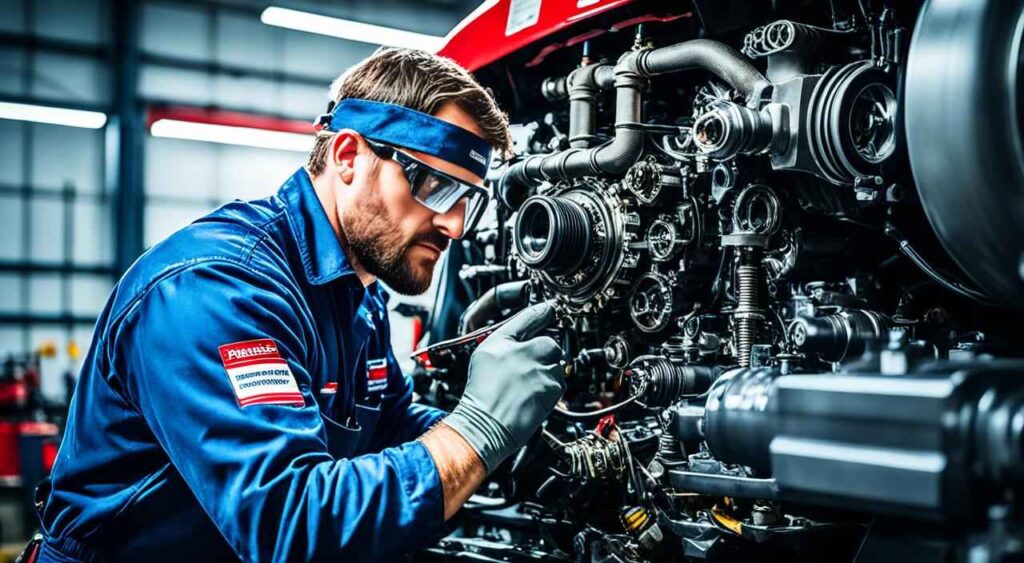Do you know that you don’t need college credentials to start a career as a mechanic? This guide shows how to become one without a degree. It details the steps and key parts for success in automotive service and repair. If you’re ready to start, or love cars and want to learn more, this guide helps. It leads to a fulfilling career without needing a traditional degree.
Key Takeaways
- Understanding the step-by-step process to become a mechanic without a degree.
- Identifying key skills and experiences that compensate for the lack of formal education.
- Exploring alternative educational pathways such as trade programs and certifications.
- Recognizing the importance of hands-on experience in starting your career.
- Learning about the latest industry trends and technological advancements in auto mechanics.
- Examining the long-term career prospects for mechanics in the automotive industry.
- Gaining insight into the significance of industry certifications.
Understanding the Role of an Auto Mechanic
The role of an auto mechanic has grown a lot, thanks to new car technologies. These mechanics are key to fixing cars. They handle many responsibilities, have lots of necessary skills, and keep up with changing auto repair and tech. Let’s dive into what makes their job so special.
Core Responsibilities of Auto Mechanics
Auto mechanics fix, maintain, and check cars to make sure they’re safe and work well. They deal with mechanical and electrical problems, do routine checks, and meet safety standards. Their job covers areas like:
- Engine diagnostics and repairs
- Electrical system services, such as battery replacement and circuit repairs
- Brake system maintenance and repair
- Transmission services and troubleshooting
- Exhaust system repairs
- Heating and air conditioning system maintenance
- Performing state emission inspections
- Providing clients with detailed repair reports and cost estimates

Necessary Skills for Success in the Field
To be great at their job, mechanics need many skills. These skills help them do their job well and make customers happy. Important skills include:
| Technical Expertise | Problem-Solving | Customer Service |
|---|---|---|
| Comprehensive knowledge of automotive systems and components | Ability to diagnose issues quickly and accurately | Strong communication skills to explain complex repairs |
| Familiarity with diagnostic software and hand tools | Developing cost-effective solutions | Empathy and understanding towards customer concerns |
| Continuous learning to keep up with new technologies | Resourcefulness in challenging situations | Efficient time management to handle multiple jobs |
The Evolving Nature of Auto Repairs and Technology
Car tech is always changing, which means mechanics must always be learning. They work on hybrids, electric cars, and more. Mechanics need training and certificates to work on complex systems.
They also focus on making cars more green and tech-savvy. This means mechanics are always learning and adapting. Innovation drives their world.
How to Become a Mechanic Without a Degree
Want to be a mechanic with no degree? It’s possible if you love cars and learning. Many mechanics started their journey by getting real experience, in places full of chances to learn by doing. This hands-on approach is a great path to success.
Real-World Experience: Internships and Early Employment Programs
Working in the field offers the best learning. Programs like internships and early jobs give vital hands-on knowledge. Classroom lessons can’t compare.
Apprenticeships are a structured way to learn repair and maintenance skills. They help newcomers become experts, offering the real-world experience the car industry values.
Acquiring the Right Tools for a Mechanic’s Toolkit
Gathering the right tools is another crucial step. Investing in quality tools shows dedication. It also means being ready for various tasks. Mechanics choose their tools carefully, thinking about what they need now and later.
| Essential Starter Tools | Advanced Equipment |
|---|---|
| Screwdrivers (various sizes) | Handheld diagnostic scanner |
| Wrench set | OBD-II scanner |
| Ratchet and socket set | Circuit tester |
| Pliers (various types) | Battery tester and charger |
| Hammer and mallet | Air compressor |
| Jack and jack stands | Torque wrench |
Starting with an internship or gathering their first toolkit marks the beginning of a fulfilling career journey for those aiming to be mechanics without a degree.

Foundation for Aspiring Mechanics: The Value of a High School Diploma or GED
A career in the automotive industry starts with knowledge and skills. These often come from high school. Understanding the value of a high school diploma for mechanics is key. It brings vital learning in math, science, and tech. This learning is crucial for fixing cars.
High school isn’t just about tech skills. It also teaches you how to solve problems and think critically. These qualities are key for mechanics to diagnose car issues well. Let’s look at why high school is so important for mechanics. Also, we’ll see how a GED can help with career growth.
Why High School Education Is Important for Mechanics
- Foundation in relevant subjects such as math and physics, which are applied regularly in automotive diagnostics and repair.
- Development of soft skills, including communication and collaboration, which are vital when interacting with colleagues and clients.
- Exposure to technology, through courses or clubs, can ease the transition into increasingly digital automotive environments.
The Role of a GED in Pursuing an Automotive Career
Not getting a traditional high school diploma? A GED can change your life. The role of GED in automotive career paths is big. It shows you’re ready for more technical training or entry-level jobs in the field.
| Qualification | Benefits | Opportunities |
|---|---|---|
| High School Diploma | Comprehensive foundational education, eligibility for advanced training programs | Employment in dealerships, service centers, and specialized repair shops |
| GED Certificate | Flexible acquisition, recognized equivalency to high school diploma | Enrollment in technical training programs, entry to apprenticeships |
Trade Programs: Your Pathway to Becoming a Mechanic
Start a journey to a rewarding career by looking into trade programs for becoming a mechanic. These programs offer the technical know-how and hands-on experience you need. This route helps you excel in the auto industry.
Benefits of Technical Trade Programs
Choosing a trade program has many benefits of trade programs not found in typical four-year colleges. You’ll dive deep into the workings of cars and get the practical skills for work. These programs are shorter, so you start working and earning money sooner with less debt.
- Intensive hands-on training in real workshop environments
- Networking opportunities with industry professionals
- Increased job readiness upon completion
- Potential for higher entry-level salary due to specialized skills
Types of Degrees and Certifications Offered by Trade Schools
The types of degrees and certifications offered by trade schools suit varied career paths in the auto field. They range from certificates to associate degrees. Employers highly value these for their practical focus.
| Certificate Programs | Associate Degrees | Specialized Certifications |
|---|---|---|
| Automotive Repair | Applied Science in Automotive Technology | Manufacturer-Specific Training |
| Diesel Technology | Automotive Service Management | Advanced Engine Performance |
| Collision Repair | Occupational Studies in Automotive Technology | Automotive HVAC Systems |
Whether you prefer quick training or in-depth study, these programs tailor your education. You get skills perfectly matched to starting your career as a mechanic.
Specialized Training to Sharpen Your Skills
Want to be a top mechanic? It takes more than basic know-how. Specialized training for mechanics boosts your expertise and skills. The car industry is always changing. So, learning more and upgrading your skills is crucial.
Sharpening your skills as a mechanic means joining specialized training. These courses focus on car tech, advanced tools, and new repair methods. This makes you better at handling tough jobs.
- Manufacturer-Specific Programs: Training by car brands teaches you about their tech. This helps you become an expert in certain cars.
- Advanced Diagnostics Training: Cars are now full of electronics. Learning to use high-tech diagnostic tools is a must.
- Hybrid and Electric Vehicle Training: With a push for green cars, knowing how to work on hybrids and electric vehicles is a plus.
Getting specialized training for mechanics widens your abilities and job chances. Employers like mechanics who know a lot and can handle different tasks. This training also gives you certificates that prove your skills.
To grow in the auto repair world, seek out specialized training. It fills you with the knowledge to do advanced repairs. It shows you’re all in on sharpening your skills as a mechanic. This opens doors to a rewarding career.
Industry Certifications: Taking Your Expertise to the Next Level
In the automotive repair world, mechanics stand out by getting industry certifications. These certifications show they are top in their field. They also show a strong commitment to being the best and knowing the latest practices.
Understanding ASE Certification and Its Importance
The ASE certification is key for mechanics aiming for the top. The National Institute for Automotive Service Excellence, or ASE, is a group focused on making vehicle repair better. They test and certify repair experts. The importance of ASE certification is huge; it is a sign of true automotive skill and trustworthiness. To get this certification, one must pass hard tests and show they are skilled with their hands. This assures customers that the mechanic knows their stuff.
The Edge Given by Manufacturer-Specific Certifications
Alongside ASE’s broad recognition, there are manufacturer-specific certifications. These are from big names like Ford, GM, BMW, and more. They give mechanics deep knowledge of specific vehicle technologies and standards. Having these credentials means a mechanic understands certain car brands. This expertise not only improves service quality but also helps in career growth within dealerships or service centers linked to those brands.
Getting industry certifications for mechanics shows your passion for your work. It means your skills are always sharp in the fast-changing car world.
Mechanic Industry Overview: Career Prospects and Salary Outlook
The mechanic industry is key to the world’s economy. It always needs skilled people to fix a variety of vehicles. The career prospects for mechanics look good, with steady job growth and a bright future.
Projected Job Growth and Demand for Skilled Mechanics
Even with new tech, there’s a big need for skilled mechanics. Analytics predict a rise in job growth for mechanics. This is because cars need upkeep and people use them a lot. It’s a great time to think about becoming a mechanic.
Income Potential for Auto and Diesel Mechanics
Let’s talk about how much auto mechanics and diesel mechanics make. Auto mechanics work on gas cars and get good pay for it. Diesel mechanics work on big diesel vehicles and often earn more. This is because they’re specialized and vital to transport. Both jobs can pay well, especially with more learning and certifications.
Conclusion
Choosing to become a mechanic without a degree is a journey filled with growth. In this guide, we discussed the auto industry’s various aspects. These include how passion, hard work, and learning can replace a formal degree. We looked at essential steps for moving forward in this profession.
We started by emphasizing the importance of high school education. It prepares future mechanics well. If needed, getting a GED can also help. We talked about the benefits of trade programs. These programs offer specialized education and hands-on training for car experts. We also mentioned how working early, like through internships, provides valuable skills and tools.
Getting industry certifications, such as ASE certificates, is crucial. It boosts your reputation and knowledge. The mechanic field has lots of job possibilities and can pay well for hardworking people. If you choose this path, know that your success depends on your commitment to improving your skills. With the tips from this conclusion, you’re ready to begin a rewarding mechanic career without a degree.
FAQ
Can I become a mechanic without a college degree?
Yes, you don’t need a college degree to be a mechanic. This guide will show you how to start a mechanic career without one.
What are the core responsibilities of auto mechanics?
Auto mechanics inspect, diagnose, and fix vehicles. They work on engines, brakes, and electrical systems.
What skills are necessary for success as an auto mechanic?
Good auto mechanics need to solve problems, pay attention to detail, and know a lot about cars. They also need good hand skills.
How is the field of auto repairs and technology evolving?
Auto repair and tech are changing fast because of new car technologies. Mechanics must keep learning to know the latest repair methods and tools.
Why is a high school diploma or GED important for aspiring mechanics?
For mechanics, a high school diploma or GED is crucial. It gives them the basic knowledge and skills for working on cars.
What role does a GED play in pursuing an automotive career?
A GED lets people who didn’t finish high school go into car mechanics. It’s another way to start this career.
What are the benefits of technical trade programs for becoming a mechanic?
Technical programs give hands-on practice and focused learning to future mechanics. They teach important skills for the job.
What types of degrees and certifications are offered by trade schools?
Trade schools give out degrees like an Associate’s in Automotive Technology. They also offer ASE certifications and special training for certain car brands.
Why is specialized training important for mechanics?
Special training helps mechanics get better at specific repair work. It can lead to better jobs and set them apart from others.
How can I become a mechanic without a degree?
To be a mechanic without a degree, start with internships and work experience early on. It’s also key to have the right tools.
What are industry certifications and why are they important for mechanics?
Certifications like ASE show a mechanic’s skill level. They are respected and can help get better job offers.
What is ASE certification and why is it important?
ASE certification proves a mechanic knows their stuff. It means they do quality work.
What advantages do manufacturer-specific certifications provide?
Certifications for specific car brands make a mechanic an expert on those vehicles. This advantage can help in getting jobs that focus on those brands.
What are the career prospects and salary outlook for mechanics?
Mechanics have good job chances ahead with growing demand. They can also earn well, especially in auto and diesel work.
